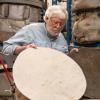Looking back
2024 – Year of Research Impact
December 17, 2024
Share

In 2024, Queen's researchers made great strides towards realizing a better future for the planet, advancing health and wellbeing, leading research outreach, discovering new frontiers, and achieving research funding and awards.
The final weeks of each year are always a good time to look back and reflect on accomplishments and milestones. In 2024, Queen’s researchers explored new frontiers of knowledge that took them from the bottom of lakes to the far away corners of the universe. They made new discoveries, secured research funding, and were recognized with major prizes and awards. The university also welcomed new talent and cultivated new partnerships locally, regionally, and globally.
Here’s a selection of 15 research stories and key moments from 2024 that you don’t want to miss:
A better future for the planet
- Transforming nuclear materials for a greener future – With a research program that will improve the efficiency, reliability, safety, and cost-effectiveness of nuclear energy systems, Yanwen Zhang was named the Canada Excellence Research Chair in Impact of Radiation in Energy and Advanced Technologies.
- Building landfills that safeguard the environment – Recognized with the 2024 NSERC Herzberg Canada Gold Medal, civil engineer Kerry Rowe is tackling our waste problem with groundbreaking work in the design of landfills that prevent contaminants from spreading.
- What mud tells us about climate change? – A lot, according to biologist John Smol, whose field-leading work in sediment analysis has informed understanding of human impact on lake environments. These efforts were awarded with the 2024 NSERC Strickland Prize for Societal Impact.

Dr. Yanwen Zhang, Canada Excellence Research Chair in Impact of Radiation in Energy and Advanced Technologies.

Dr. Kerry Rowe, 2024 NSERC Herzberg Canada Gold Medalist.
Advancing health and wellbeing
- Cancer research transformed by landmark gift – Thanks to a milestone donation, researchers at the Sinclair Cancer Research Institute will combine expertise in biology and genetics, clinical trials, and health care, and epidemiology to advance cancer research and improve outcomes for patients in Canada and around the world.
- Obesity and the brain – How are memory and cognitive function impacted by obesity? Neuroscientist Fernanda De Felice is investigating the connections between the body and conditions like obesity and our brain functions, including memory and cognitive function.
- Understanding the genetic basis of bleeding disorders – Through the work of clinician scientist Paula James, we are advancing research to improve diagnosis and treatment of inherited blood diseases that affect one in 1,000 individuals globally and in Canada.

From left to right: Dave Tidman, patient advocate; Andrew Craig, Director, Sinclair Cancer Research Institute; Jane Philpott, former Dean, Queen’s Health Sciences; Murray Sinclair, alumnus and donor; Annette Hay, Senior Investigator, Canadian Cancer Trials Group; Cara Sinclair; Cathy Tidman, patient advocate; Patrick Deane, Principal and Vice-Chancellor; Paul Kubes, Canada Excellence Research Chair in Immunophysiology and Immunotherapy.
Research outreach
- Preparing for totality – Queen’s research experts across physics, the humanities, and health sciences helped to educate, prepare, and mobilize communities in Kingston and across Canada for the first total solar eclipse regionally in almost 700 years.
- Integrating sustainability in the curriculum – Queen’s education researchers partnered with No.9, a local nonprofit organization, to create an innovative new program aimed at promoting sustainability and the United Nations’ Sustainable Development Goals in local schools.
- Engaging communities in science and research – Across disciplines faculty, staff, and students got together to bring hands-on STEM activities to Science Rendezvous Kingston. With over 5,000 participants, it was one of the largest science festivals in Southeastern Ontario.

Queen’s research experts across physics, the humanities, and health sciences helped to educate, prepare, and mobilize communities in Kingston for the first total solar eclipse regionally in almost 700 years.

Science Rendezvous Kingston welcomed over 5,000 participants in 2025.
New frontiers
- McDonald Institute (MI) receives $45.5M in federal support – MI, the Queen’s-based, national network for astroparticle physics, received a boost in funding that will fuel globally-leading research unravelling the mysteries of the universe, including dark matter and neutrino science.
- Searching for cosmic rays 40 km above ground – Astrophysicist Nahee Park was part of an international team that launched an enormous weather balloon into the upper atmosphere to capture neutrinos and cosmic rays.
- Sparking Canada’s supercomputing renaissance – We learned why electrical and computer engineering researcher Ryan Grant wants Canada to become a supercomputing powerhouse: the technology can solve complex problems, from designing new proteins for drug treatments to unlocking new frontiers in artificial intelligence.

Astrophysicist Nahee Park was part of an international team that launched an enormous weather balloon into the upper atmosphere to capture neutrinos and cosmic rays. [Photo credit: Stephane Coutu (Penn State University).]
Research funding and awards
- Empowering transformative research – Three Queen’s research teams secured over $18M from the Canada Foundation for Innovation in research infrastructure support for projects in translational medicine, nuclear energy, and environmental sciences.
- New generation of research leaders – Queen’s expanded its undergraduate research programs to offer new unique training and professional development opportunities. A total of 167 students participated in programs that gave them first-hand experiences to gain the translatable skills and training needed to pursue high-impact research.
- New and renewed Canada Research Chairs – The university welcomed 18 new and renewed Canada Research Chairs, announced in March and November. In the next few years, these researchers will lead programs to understand and mitigate climate change impacts within Indigenous Protected Areas, elevate debates in Afrofeminist thought and political transformation, advance neuromorphic photonic computing, address affordable housing scarcity, and much more.



